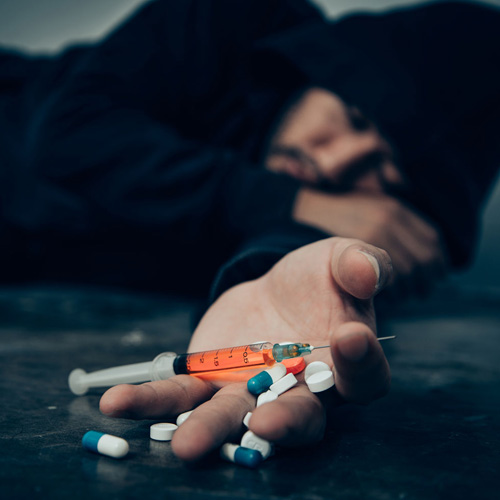Drug Addiction

Drug addiction is a dependence on an illegal drug or a medication. A person may have a physical dependence on a substance without having an addiction. For example, certain blood pressure medications do not cause addiction but they can cause physical dependence. Other drugs, such as cocaine, cause addiction without leading to physical dependence.
The exact cause of drug addiction is not known. However, a person’s genes, the action of the drug, peer pressure, emotional distress, anxiety, depression, and environmental stress all can be factors.
There are several stages of drug use that may lead to dependence.
- Experimental use — typically involves peers, done for recreational use; the user may enjoy defying parents or other authority figures.
- Regular use — the user misses more and more school or work; worries about losing drug source; uses drugs to “fix” negative feelings; begins to stay away from friends and family; may change friends to those who are regular users; shows increased tolerance and ability to “handle” the drug.
- Daily preoccupation — the user loses any motivation; does not care about school and work; has obvious behavior changes; thinking about drug use is more important than all other interests, including relationships; the user becomes secretive; may begin dealing drugs to help support habit; use of other, harder drugs may increase; legal problems may increase.
Dependence — cannot face daily life without drugs; denies problem; physical condition gets worse; loss of “control” over use; may become suicidal; financial and legal problems get worse; may have broken ties with family members or friends.
The type and duration of treatment depend on the individual. There are two primary tools:
- Medication: Methadone and naltrexone are two drugs that help people who are addicted to opiates. Antidepressants are needed when someone also has depression, anxiety, bipolar or psychosis. Two therapeutic — not preventive — vaccines are available to relieve the withdrawal symptoms of cocaine and methamphetamine addicts.
- Counseling: Cognitive behavioral therapy (teaching someone to think differently about their circumstances), family therapy and positive reinforcement are important parts of fighting drug addictions through counseling.
The only way to truly prevent drug addiction is to never take drugs.
